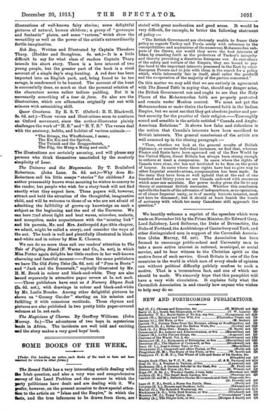SOME BOOKS OF THE WEEK.
[Under tAis heading we notice such Books of the week as haw not been nesinved for review in otityr forma.] The Round Table has a very interesting article dealing with the Irish question, and also a very wise and comprehensive survey of the Land Problem and the manner in which the party politicians have dealt and are dealing with it. We prefer, however, on the present occasion to draw special atten- tion to the article on "Islam and the Empire," in which the hots, and the true inferences to be drawn from them, are stated with great moderation and good sense. It would be
very difficult, for example, to better the following statement of policy :-
" The British Government are obviously unable to frame their policy as regards Turkey and Persia solely with reference to the susceptibilities and aspirations of the numerous Mohammedan sub- jects of the Crown, nor would they serve the best interests of Islam by standing forth as the protectors of Turkey's integrity. and thereby provoking a disastrous European war. As custodians of the safety and welfare of the Empire, they are bound to pay due heed to the important interests possessed in the East by other European Powers and to join with them in the search for a policy which, while inherently fair in itself, shall enlist the goodwill and the co-operation of the majority of the parties concerned."
On this matter we may add that we are entirely in agreement with The Round Table in saying that, should any danger arise, the British Government can and ought to see that the Holy Places of the Mohammedan faith are properly protected and remain under Moslem control. We must not pet the Mohammedans or make theirs the favoured faith in the Indian Empire, but we must see that they get absolute justice and per- fect security for the practice of their religion.—Thoroughly sound and sensible is the article entitled " Canada and Anglo- American Relations." It shows how false and ridiculous is
the notion that Canada's interests have been sacrificed to British interests. The general conclusions of the article are well summed up in the closing paragraph :-
"Thus, whether we look at the general results of British diplomacy, or consider individual instances, we find that, whereas France and Spain have been squeezed out of the New World by the United States, Great Britain has always been strong enough to enforce at least a compromise. In cases where the rights of Canada were clear, she has not hesitated to be firm on the point of honour. In cases where those rights have had to give way to other Imperial considerations, compensation has been made. In the main they have been so well upheld that at the end of one hundred and thirty years we see Canada endowed with resources which none can calculate. Her power to-day gives the lie to any theory of continual British surrender. Whether this conclusion upholds the hands of the advocates of independence, or co-operation, or of closer Imperial unity, or is of merely historic interest, need not hero be discussed ; but it should at least banish the touch of acrimony with which too many Canadians still approach the question."










































 Previous page
Previous page